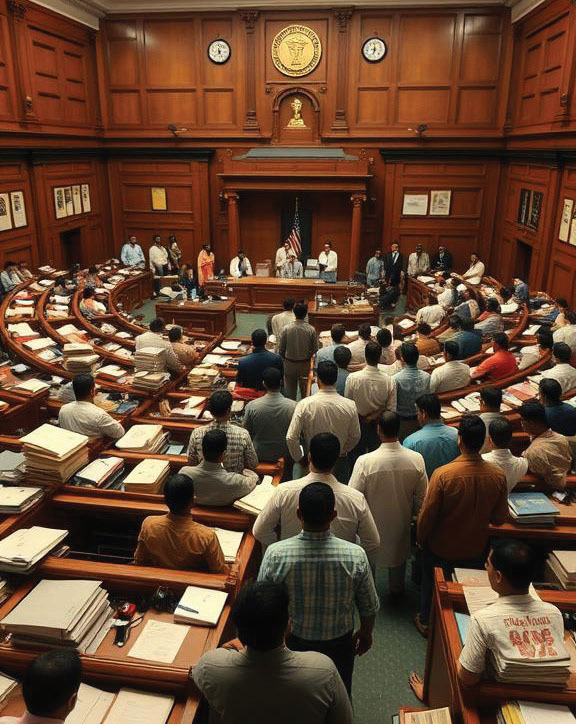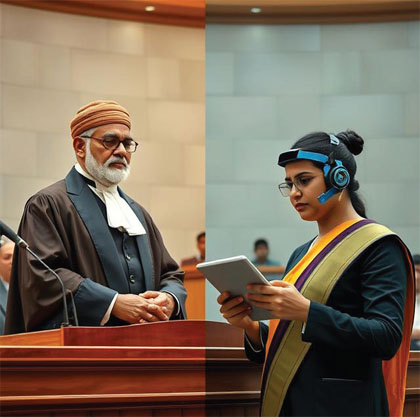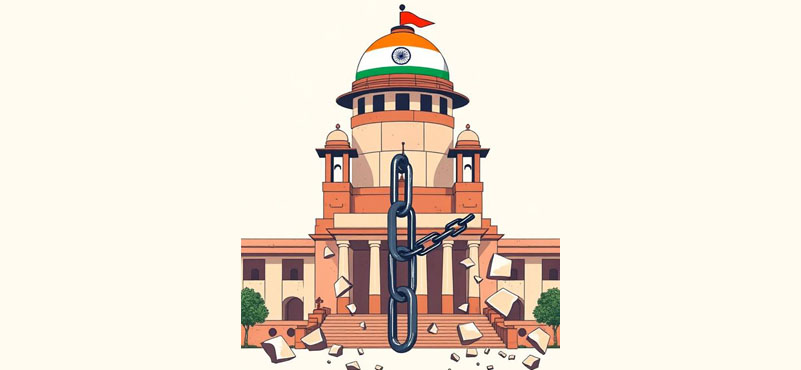Sanjeev Sanyal, Member, PM’s Economic Advisory Council, in a recent lecture, ‘prayed’ to the legal community to get rid of archaic leftovers like going on vacation when the courts close all work, unlike any other profession, or introducing procedures that help their profession but add woes to the system. Justice delayed is just denied. The ‘caste system’ within the profession must also be discontinued, he says, where anybody should be allowed to argue its case.
Sharing somewhat broader economic perspective of the legal system and how I as a policy maker think about this. So, I will be somewhat critical but hopefully you will take it in the right spirit, because we are in this boat together. So, as many of you know that India has just this year become the world’s fourth largest economy. We are still the fastest growing economy in the world. In about 24 months’ time we will become the world’s third largest economy. Then of course it’s a long slog to the other big two. Nevertheless, let it also be clear. That the way our demographics are set up, we effectively have somewhere between 20 and 25 years to become Viksit Bharat.
 Effectively, this is the period in which we basically have to make it. After that, we will grow old. Just like Japan, just like Europe today, we too will grow old. These are the two decades in which we have to grow as rapidly as we can. In the hope that we are at least upper middle class, may not become really rich. This is a national opportunity for us not just as a country but as a civilization to come back.
Effectively, this is the period in which we basically have to make it. After that, we will grow old. Just like Japan, just like Europe today, we too will grow old. These are the two decades in which we have to grow as rapidly as we can. In the hope that we are at least upper middle class, may not become really rich. This is a national opportunity for us not just as a country but as a civilization to come back.
But in this, the legal fraternity really has to play a role. And the reason for this is, I am afraid, the judicial system and the legal ecosystem, but the judicial system in particular, in my view, the single biggest hurdle to becoming Viksit Bharat and growing rapidly. I have said this before and I am saying it again.
The inability to enforce contracts in time or to deliver justice is now such a major constraint. If we do not see a major overhaul of the entire legal ecosystem, it will not matter what else we are doing in the rest of the system. And the physical infrastructure will get, five, six years, it will become good enough. Maybe we need to upgrade our cities. All of that we will manage. But the legal system really has to be fixed.
And let me show you what happens, as a result as a policy maker, when we are making rules and regulations. We suffer from what is called the 99-1 problem. What is the 99-1 problem? When you are making rules, regulations, policies, of those rules, regulations, policies, the bulk of it, really reflects the problems of of misuse, that of dispute and so on and so forth.
Now, in any functioning system, that of exceptions should actually get sorted out by the legal system. But because I do not think it will get sorted out there, all the rest of the of laws, regulations, and all kinds of complicated things that I have to do is effectively to take care of that . And of course, it feeds back into itself into a spiral. And so now we have ended up with the complicated system further creating its own complications and so on.
 We really have to do something about this. And here, of course, everybody will talk. I’m sure the others will speak about the legal processes that need to be radically changed. But I think, we need first of all, a cultural change, a cultural acceptance, which the legal profession needs to have, about the problems that it faces, rather than to have the rather self-congratulatory tone which one tends to hear in conferences like this.
We really have to do something about this. And here, of course, everybody will talk. I’m sure the others will speak about the legal processes that need to be radically changed. But I think, we need first of all, a cultural change, a cultural acceptance, which the legal profession needs to have, about the problems that it faces, rather than to have the rather self-congratulatory tone which one tends to hear in conferences like this.
I’m sorry if I’m being a little bit rude. But anybody who has been to any conference in which I have spoken will know that that is my usual approach. And because I mean well. So, as I said, please, take it in the right spirit.
Now usually what happens is all this is blamed on some colonial legacy of processes and so on. But in fact, we keep adding new problems to the system. And I’m going to use one example because I heard it being spoken about a little earlier. So, I want to talk a little bit about pre-litigation mediation. This is not an old problem. We have only in the last decade or so added this as a new problem. The legal profession thinks it’s a solution. But the rest of us think it’s a problem. So let me tell you why.
Because according to Section 12A of the Commercial Courts Act of 2015, this was for commercial cases, it was turned into a mandatory step. Right? Now, let me clarify. I have no problem with the idea of mediation. It’s a good thing. It should be done. But to make it mandatory has caused the following problem.
Now I collected data for five years till year 24, from the two main commercial courts of Mumbai. Commercial capital, commercial courts, best place to get data on this issue. And I found that between 98 to of pre-litigation mediation actually fails. It then goes back into the same courts that you are complaining about and trying to avoid. All you have achieved is added six months to the process. Lawyer’s fees, mediators, all kinds of other things. Not to mention huge efforts to avoid that loop.
What is the benefit to the system? As I said, I have no problem with mediation. Why not make this simply voluntary? And yet, huge amount of effort was put in by the legal profession to actually add this to the mediation bill of court 2023. And it nearly became mandatory. A failed system which we know doesn’t work was nearly added and made mandatory for civil cases as well.
It is because of few people like myself who wrote rather angry notes to the parliamentary committee that it eventually did not become a part of the act. But the fact is there has to be some level of responsibility that the legal profession has of adding something that may be beneficial to you as a profession but is a massive cost to the rest of the system.
So, please think about this for the rest of the system and it really annoys me when I hear self-congratulatory tones, when you come across these kinds of things, which are beneficial to a profession, but is a huge cost to the rest of the system.
Number two. We need to move away from the way the legal profession is set up. It’s set up as, I’m afraid, in a mediaeval mould. Where you have a caste system of stratification of lawyers that goes somewhat… You have senior advocates versus normal advocates. You have advocates of record. Why are all these people needed in the 21st century? Just have a standardized SOP. Let anybody run it. In fact, for many levels of legal work why do you even require somebody to have a legal degree to argue your case? This is the age of AI.
If I as a citizen can figure out how to argue my case of perplexity, I should be allowed to do it. If I want to put something as record, let me do it. You tell me exactly what the process is, I will follow it. That I’m not arguing that I will not. But why do you need this caste system in there? And that, by the way, is also true of the judiciary. There is a clear difference between those who become judges from being senior advocates and those who are promoted from the lower courts.
If you want to get talent to come into the judiciary you have to have a system where the best makes his way up the system. Can start right at the bottom and make their way up the system to the top. Because if that doesn’t happen, then clearly then don’t complain that the lower courts do not attract the level of quality that you want.
Number three. We need a culture change in the way the whole thinking about this profession works. Just to give you an example. Not to be taken personally by anybody. You cannot have a profession where you use words like ‘my lord’. Or when you’re doing a petition, it’s called a ‘prayer’. You’ve got to be kidding me. We are all citizens of the same democratic republic. It is not appropriate one citizen to call another citizen ‘my lord’. Or to pray to them. It is not acceptable. We’ve got to end this.
We also have to end this whole custom of having these long vacations. I’m sorry. This cannot go on. The judiciary is a public service, like any other part of the state. I also work in the government. I also take vacations. But the judges are very happy for them to take vacations, but why should the entire court system be shut down for this?
After all the police men also take vacations. I also take vacations. Do you shut down the entire police department for this? Let’s say some other profession does this. Let’s say the doctors decide that we will take summer vacation, winter vacation and shut down the hospitals for a large part of the time. And we will have vacation benches for emergency cases. Would that be acceptable?
Now the reason I am expressing these thoughts is very simple. Because we as a people, as I pointed out, have about 20-25 years to make it. We don’t have time to waste. We all have to pull together. You are as much citizens as I am and I have great faith in my fellow citizens that they will do the right thing. So, I have really come here to beseech my fellow citizens that you from the legal profession really pull up your socks because we are waiting for you to really push for this. If it makes you feel a little bit better, I have stood in similar events by other professions – bureaucrats, chartered accountants, fellow economists – and made similar pleas over the years.
And I have to say although there was a significant amount of hostility in the beginning, I have begun to now make a dent. Bureaucratic processes are slowly but steadily getting improved. Far from being shunned, I am now actually invited to LBSA at Mussoorie to give talks, and you know my tone of voice. Senior level officials, on their part of their training, put up with me. The way, chartered accountancy profession, or in fact my own profession of economists, have had to change themselves, has to be done because we have to be willing to go out there and question things from first principles. Because that is the only way change will happen. So let me stop right here, state that dear fellow citizens, the moment has come when we are the generation that has to change things, not wait for anybody else; it’s between you and me, we are on the same ship.
ABOUT THE AUTHOR
 Sanjeev Sanyal is an Indian economist and popular historian known for writing books based on revisionist Hindutva history which lack scholarly backing. A member of the Economic Advisory Council to the Prime Minister of India, he has helped prepare six editions of the Economic Survey of India, represented India at G7 and OECD meetings; he is also the Chancellor of Gokhale Institute of Politics and Economics, Pune.
Sanjeev Sanyal is an Indian economist and popular historian known for writing books based on revisionist Hindutva history which lack scholarly backing. A member of the Economic Advisory Council to the Prime Minister of India, he has helped prepare six editions of the Economic Survey of India, represented India at G7 and OECD meetings; he is also the Chancellor of Gokhale Institute of Politics and Economics, Pune.







